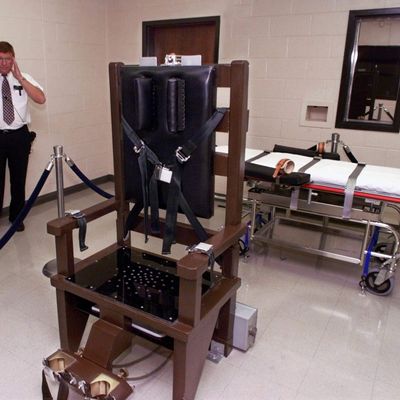
The controversy surrounding lethal injection drugs and their availability intensified following Oklahoma’s botched execution of Clayton Lockett, and now Tennessee lawmakers believe they’ve come up with a solution: electrocution. On Thursday evening, Republican Governor Bill Haslam signed a bill into law allowing the state to electrocute death-row inmates if lethal injection drugs can’t be obtained. Eight states allow inmates to choose the electric chair rather than lethal injection, but the new law makes Tennessee the only state where convicts will not have a choice in the matter.
Previously, Tennessee allowed inmates to opt for electrocution only if they committed their crimes before 1999, and the electric chair has not been used in the state since 2007. Before Tennessee legislators passed the bill in April, Attorney General Bob Cooper advised them that the law would be constitutional. However, Nashville criminal defense attorney David Raybin, who helped draft the state’s death penalty law 40 years ago, disagrees. He told the Associated Press that lawmakers can change the preferred method of execution, but it’s unconstitutional to do so retroactively. The issue is likely to wind up in court.
Lethal injection drugs have been in short supply since Europe began boycotting drug sales to U.S. prisons, and Tennessee is not the first state to consider other methods of execution. Recently, lawmakers in several states have called for reinstating the electric chair, the gas chamber, or firing squads. While those methods are generally considered more barbaric, this month, New York’s Benjamin Wallace-Wells reported that in the last century only two percent of electrocutions and five percent of gassings have gone awry, compared to seven percent of lethal injections. As a Utah representative pushing to allow death by firing squad argued, “It sounds like the Wild West, but it’s probably the most humane way to kill somebody.”






























